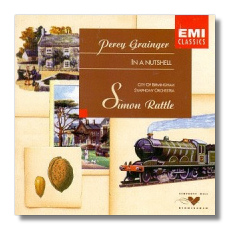
The Internet's Premier Classical Music Source
Related Links
- Grainger Reviews
- Latest Reviews
- More Reviews
-
By Composer
-
Collections
DVD & Blu-ray
Books
Concert Reviews
Articles/Interviews
Software
Audio
Search Amazon
Recommended Links
Site News
 CD Review
CD Review
Percy Grainger

In a Nutshell
- Grainger:
- In a nutshell: Suite
- Arrival Platform Humlet
- Gay but Wistful (Tune in a popular London style)
- Pastoral
- The Gum Suckers' March
- Train Music (Standard symphonic version by Eldon Rathburn)
- Country Gardens: English Morris Dance Tune (Version for Stokowski, 1950)
- Lincolnshire Posy
- Lisbon (Sailor's Song)
- Horkstow Grange (The Miser and His Man - a local tragedy)
- Rufford Park Poachers (Poaching Song)
- The Brisk Young Sailor (who returned to wed his true love)
- Lord Melbourne (War Song)
- The Lost Lady Found (Dance Song)
- The Warriors: Music to an imaginary ballet for orchestra & three pianos *
- Ravel (arr. Grainger): La vallée des cloche (Miroirs)
- Debussy (arr. Grainger): Pagodes (Estampes)
* Malcom Wilson, Roderick Elms, Wayne Marshall, pianos
City of Birmingham Symphony Orchestra/Simon Rattle
* City of Birmingham Symphony Orchestra/Stephen Frost
EMI CDC 56412 DDD 69:59
Except for "Danny Boy" and other Grainger pieces I heard on Stokowski's LP, much of this is new to me. I have heard the Debussy and Ravel arrangements before, on Cala. I found the experience interesting. While I am not about to agree with the writer of the insert notes that "Grainer was one of the most extraordinary musical figures of this century, a man ahead of his time…" I did develop some new insights.
Grainger was an Australian composer and was an exact contemporary of Leopold Stokowski. In fact, listening to this disc is not unlike listening to one with Stokowski transcriptions. At other times his work reminds me of Delius, sharing that pastoral aspect. It is mostly "light' and "accessible' but none less for it. You will not hear existential Mahlerian searching here. This is more like something you'd hear at an MGM Movie. Lyndon Jenkins' wonderful insert notes provide an excellent musical map as you listen. I had but one complaint. When discussing Stokowski's request for a different orchestration of Country Gardens, Jenkins states that Grainger was "at first a little irked that his original orchestrations were not good enough…" In fact, this was a collaborative idea of the two musicians and a way for Grainger to make a little more money by producing a new orchestration.
A bit more about the music. In addition to the other composers already mentioned, for some reason Malcom Arnold's Dances kept coming to mind as I listened to Grainger's Lincolnshire Posy for Military Band. I finally got so bothered I put the last section of Grainger's piece, "The Lost Lady Found (Dance Song)" and A/B'd it with the Andantino of Arnold's English Dances, Set 1. At first there doesn't seem to be any resemblance, but that is on the surface. If you listen to the veiled "background" rhythm in Arnold's piece, you can hear the primary melody in Grainger's. It is a variation, granted, but I can hear it. This has led to many interesting thoughts about how composers "borrow" and probably don't even mean to in most cases. I will not bore you with that now, but be afraid….be very afraid. I really enjoyed, in some shamed way, the quasi-pseudo-oriental first section of "In A Nutshell". "Gay, but Wistful" has a southern-ol' South feel to it, even more than a Delius piece. "Train Music" was written, according to the composer, as the kind of music you might hum while anxiously awaiting a train. It certainly fills that prescription…I can visualize it as the music for such a scene in a movie. "The Warriors" is also available on a recording by John Elliot Gardiner, coupled with Holst's "Planets". I have not heard that recording, but can say that I prefer it in this collection as opposed to having yet another "Planets" in my collection. In short, there is a lot of delightful, and occasionally memorable tunes here.
The recording here is excellent, providing more evidence of the excellence of the 20-Bit technology. Insert notes, as mentioned, are very good. Rattle and his orchestra play the music as if it was in their blood. What else could you ask for? Enjoy!
Copyright © 1998, Robert Stumpf II



















